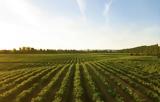Declining Employment in Greece’s Agricultural Sector
The decline in agricultural employment is a concerning development, given the sector’s crucial role in Greece’s economy, particularly in rural areas.
Employment in Greece's agricultural sector is steadily shrinking, putting additional pressure on overall employment rates in rural regions. According to the latest data from ELSTAT for the fourth quarter of 2024, employment in agriculture, forestry, and fishing recorded an annual decline of 7.6%. An even sharper drop was observed
The decline in agricultural employment is a concerning development, given the sector’s crucial role in Greece’s economy, particularly in rural areas. Several factors seem to be driving this trend, including a lack of investment in modern agricultural technologies, an aging farming population, reduced competitiveness of Greek agricultural products, and the impact of climate change on crops.
This trend could lead to more workers abandoning rural areas, accelerating urbanization and exacerbating demographic challenges in many parts of the country.
The drop in employment is having a direct impact on regions that rely heavily on these sectors. According to ELSTAT data, Western Macedonia experienced the sharpest decline in employment, with a 2.4% decrease compared to the third quarter of 2024. Epirus followed with a 1.2% decline, while Eastern Macedonia and Thrace saw a 0.8% drop. Central Macedonia and Thessaly also reported decreases, though to a lesser extent, at 0.7% and 0.5%, respectively.
At the same time, unemployment is rising sharply, with Central Macedonia recording the highest increase at 4.6% compared to the previous quarter, followed by Epirus, where unemployment rose by 3.8%.
#GREECE- Δημοφιλέστερες Ειδήσεις Κατηγορίας Ειδήσεις
- Η διαθήκη του Αλέξη Κούγια: Η τεράστια περιουσία, τα 28 ακίνητα και τα 12 αυτοκίνητα
- ΕΦΕΤ: Ανακαλούνται τυριά από τον Σκλαβενίτη λόγω λιστέριας
- Το τραγικό τέλος του Τζιν Χάκμαν: Πέθανε λιμοκτονώντας – Νεκρή επί μέρες η γυναίκα του
- Χρήστος Κούγιας για Εύη Βατίδου: «Ήξερα πως η σχέση τους είχε περάσει από χίλια κύματα, όλοι το γνώριζαν»
- Αν ο/η σύντροφός σου πει αυτές τις 5 λέξεις, σημαίνει ότι πρόκειται να σε χωρίσει
- Θανατοποινίτης τουφεκίζεται για πρώτη φορά εδώ και 15 χρόνια στις ΗΠΑ - Τα τελευταία του λόγια
- Τα σενάρια για το πώς έγινε το τροχαίο δυστύχημα με τους τρεις νεκρούς νεαρούς στη Σπάρτη
- Πρόταση δυσπιστίας: Πώς ο Κ.Μητσοτάκης έκανε την ανατροπή με θεσμικές αλλαγές
- ΟΙ ΕΠΙΣΤΗΜΟΝΕΣ ΒΡΗΚΑΝ ΔΙΑΣΤΡΙΚΟ ΤΟΥΝΕΛ ΣΤΟ ΣΥΜΠΑΝ ΠΟΥ ΘΥΜΙΖΕΙ SCI FI ΚΟΣΜΟΥΣ
- Συγκλονίζει η μητέρα του νεκρού μηχανοδηγού της εμπορικής αμαξοστοιχίας
- Δημοφιλέστερες Ειδήσεις Dikaiologitika
- «Ολική ρήξη» στις σχέσεις του Γιάννη Οικονόμου με το Μαξίμου
- Έρχεται ο ΕΝΦΙΑ με προθεσμία πληρωμής 20 ημερών για την πρώτη δόση
- Προσοχή με την προπληρωμένη κάρτα: Ποιοι πρέπει να βγάλουν νέα για τα επιδόματα
- Κυριαζίδης: Το χρονικό της θύελλας μετά το απαράδεκτο σχόλιο για τις γυναίκες
- Νέα πρόταση ΚΕΦΙΜ για «έξυπνη» φορολογία σε προϊόντα που επηρεάζουν την υγεία
- Εορτολόγιο: Μεγάλη γιορτή σήμερα 8 Μαρτίου - Γιορτάζει ο Θοδωρής
- Φορολογικές δηλώσεις: Οι παγίδες στις προσυμπληρωμένες
- Όλο και λιγότεροι οι απασχολούμενοι στον αγροτικό τομέα στην Ελλάδα
- Ανατροπές στους Πράσινους Κανόνες της ΕΕ - Τι αλλάζει για τις επιχειρήσεις
- Καιρός: Οι περιοχές με 20άρια σήμερα - Επιστρέφει η αφρικανική σκόνη

- Τελευταία Νέα Dikaiologitika
- Declining Employment in Greece’s Agricultural Sector
- Νέα πρόταση ΚΕΦΙΜ για «έξυπνη» φορολογία σε προϊόντα που επηρεάζουν την υγεία
- Ανατροπές στους Πράσινους Κανόνες της ΕΕ - Τι αλλάζει για τις επιχειρήσεις
- Φορολογικές δηλώσεις: Οι παγίδες στις προσυμπληρωμένες
- Όλο και λιγότεροι οι απασχολούμενοι στον αγροτικό τομέα στην Ελλάδα
- Καιρός: Οι περιοχές με 20άρια σήμερα - Επιστρέφει η αφρικανική σκόνη
- Έρχεται ο ΕΝΦΙΑ με προθεσμία πληρωμής 20 ημερών για την πρώτη δόση
- Προσοχή με την προπληρωμένη κάρτα: Ποιοι πρέπει να βγάλουν νέα για τα επιδόματα
- Κυριαζίδης: Το χρονικό της θύελλας μετά το απαράδεκτο σχόλιο για τις γυναίκες
- «Ολική ρήξη» στις σχέσεις του Γιάννη Οικονόμου με το Μαξίμου
- Τελευταία Νέα Κατηγορίας Ειδήσεις
- Πέγκυ Ζήνα: Έσβησε 50 κεράκια χορεύοντας Παπακωνσταντίνου - Το βίντεο του συζύγου της
- Θεσσαλονίκη: Επεισόδιο με πυροβολισμό στη Νεάπολη
- Βορίδης: Η αλλαγή του Αρθρου 86 είναι μία πρωτοβουλία που λαμβάνει υπ' όψιν της τις μεγάλες διαδηλώσεις
- Στιγμές από την βραδινή παρέλαση του Πατρινού Καρναβαλιού 2025 by Γιάγκος Ραυτόπουλος
- Μαρινάκης: Το μόνο που ενδιαφέρει την αντιπολίτευση είναι να πληρώσουν οι πολιτικοί τους αντίπαλοι
- Ταχεία αποκλιμάκωση των εκκρεμών συντάξεων - Τα στοιχεία του e-ΕΦΚΑ
- International Women’s Day: Celebrating Achievements, Advancing Equality
- Το γεφύρι του Μανώλη: Το γεφύρι – φάντασμα που εμφανίζεται και εξαφανίζεται στα μάτια των περαστικών και οι θρύλοι που το συνοδεύουν
- Άφησσος: Το στολίδι του Πηλίου που «ενώνει» βουνό και θάλασσα
- Ουρές για μια από τις επετειακές φανέλες των 100 χρόνων



